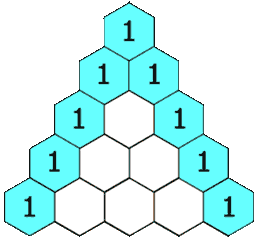| comments | difficulty | edit_url | tags | ||
|---|---|---|---|---|---|
true |
Easy |
|
Given an integer rowIndex, return the rowIndexth (0-indexed) row of the Pascal's triangle.
In Pascal's triangle, each number is the sum of the two numbers directly above it as shown:
Example 1:
Input: rowIndex = 3 Output: [1,3,3,1]
Example 2:
Input: rowIndex = 0 Output: [1]
Example 3:
Input: rowIndex = 1 Output: [1,1]
Constraints:
0 <= rowIndex <= 33
Follow up: Could you optimize your algorithm to use only O(rowIndex) extra space?
We create an array
Next, starting from the second row, we calculate the value of the $j$th element in the current row from back to front,
Finally, return
The time complexity is
class Solution:
def getRow(self, rowIndex: int) -> List[int]:
f = [1] * (rowIndex + 1)
for i in range(2, rowIndex + 1):
for j in range(i - 1, 0, -1):
f[j] += f[j - 1]
return fclass Solution {
public List<Integer> getRow(int rowIndex) {
List<Integer> f = new ArrayList<>();
for (int i = 0; i < rowIndex + 1; ++i) {
f.add(1);
}
for (int i = 2; i < rowIndex + 1; ++i) {
for (int j = i - 1; j > 0; --j) {
f.set(j, f.get(j) + f.get(j - 1));
}
}
return f;
}
}class Solution {
public:
vector<int> getRow(int rowIndex) {
vector<int> f(rowIndex + 1, 1);
for (int i = 2; i < rowIndex + 1; ++i) {
for (int j = i - 1; j; --j) {
f[j] += f[j - 1];
}
}
return f;
}
};func getRow(rowIndex int) []int {
f := make([]int, rowIndex+1)
for i := range f {
f[i] = 1
}
for i := 2; i < rowIndex+1; i++ {
for j := i - 1; j > 0; j-- {
f[j] += f[j-1]
}
}
return f
}function getRow(rowIndex: number): number[] {
const f: number[] = Array(rowIndex + 1).fill(1);
for (let i = 2; i < rowIndex + 1; ++i) {
for (let j = i - 1; j; --j) {
f[j] += f[j - 1];
}
}
return f;
}impl Solution {
pub fn get_row(row_index: i32) -> Vec<i32> {
let n = (row_index + 1) as usize;
let mut f = vec![1; n];
for i in 2..n {
for j in (1..i).rev() {
f[j] += f[j - 1];
}
}
f
}
}